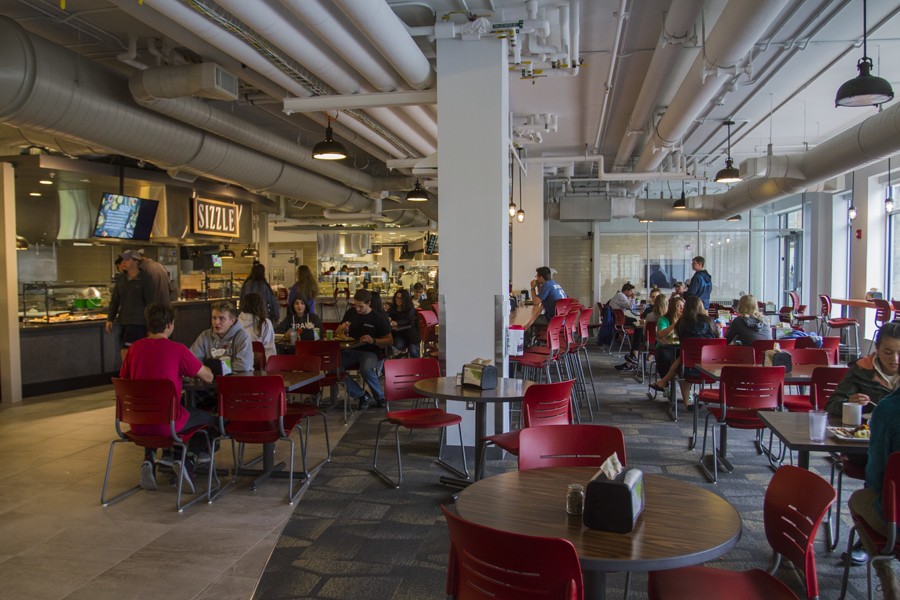Effort to help food insecure students suffers from difficult enrollment process
March 12, 2019
UVM’s pilot program to help food-insecure students access more meals is being criticized for its policies that make it difficult for students to enroll.
This spring, a coalition of students and staff trying to address food insecurity at UVM, the food insecurity working group, and UVM Dining launched a pilot program that would give food-insecure students access to more meals during the academic year.
Swipe Out Hunger is a national program that compiles donated meal swipes into a bank that students can draw from. Introducing a branch of the program at UVM was in talks for over a year and a pilot version of the project is being implemented this semester.
In December 2018, UVM students with unlimited meal plans were invited to donate a meal swipe at dining halls to be added to the bank. Donations were capped at one meal swipe per student.
During the meal drive, the working group raised 629 meals, which would only fund seven meal swipes per semester for 45 students, said Nicole Rohrig, UVM’s dietitian and a co-chair of the working group.
SGA President Ethan Foley, a junior, said he is frustrated by the working group’s decision to cap donations.
“If they want a lot of students to be helped by the program, they shouldn’t limit the amount of donations that can be made. It makes no sense,” Foley said. “To me it seems clear that it’s because of that one swipe rule, which is completely counterintuitive.”
The limitation on meal donations is part of testing Swipe Out Hunger in its first semester and is part of its “soft launch,” Rohrig said.
“Limiting swipe donations up to one was just a way to start the meal bank and see what we were comfortable doing,” Rohrig said. “We decided right out of the gate that that was where we were going to start.”
In order for students to be formally enrolled in the program and access extra meal swipes, they must have a faculty or staff member fill out an online Meal Request Form for them, Rohrig said. If a student attempts to apply without a recommendation, the Meal Plan Office will encourage them to meet with an appropriate staff or faculty member.
“Hunger is a very difficult topic and we do think it will come up in conversation when students already have a relationship with an adviser or with somebody in a department that they are close with,” Rohrig said.
First-year Zoe Silverman said that not being able to self-enroll in the program is a barrier that makes the program less accessible to students.
“Needing a professor to sign off on the fact that you don’t have enough food is ridiculous. It’s dehumanizing,” Silverman said. “That’s personal, and forcing you to have that conversation just so you can eat food is crazy.”
The working group included the faculty application requirement in order to avoid eligibility being based on income level and keep the program from being taken advantage of, Rohrig said.
“We really want this to serve students that are in need, so if there were no eligibility requirements and no contact with faculty or staff, we do believe that there would be abuse of this program where people would apply that do not necessarily need it and then there wouldn’t be enough funds for students that do,” Rohrig said.
Foley blames the low enrollment in part on the lack of marketing that has been done to promote the program.
“I don’t think the program is even being perceived on campus,” Foley said. “There’s posters, but that’s not enough. People don’t know that it exists,”
Part of the problem is that students in the working group that are in charge of Swipe Out Hunger’s marketing campaign have little time to spend promoting, Rohrig said.
“We have a few students that are working with us,” she said. “Part of the lack of marketing is because of their hours that they are able to work on the program while they’re all working on other projects as well.”
The working group intends to expand outreach for this program. This March, the working group will be launching a social media campaign and introducing digital advertisements in the Davis Center, Rohrig said.
Foley said that he is concerned about UVM Dining’s relationship with Sodexo, a for-profit business, having negative effects on the amount of meals that Swipe Out Hunger is able to offer students in need.
Silverman has also called into question the ethics of Swipe Out Hunger’s funding and takes issue with the university’s choices.
“I have unlimited meal swipes. The university is profiting off me not eating one thousand meals a semester and it seems like they are actively withholding it from others,” Silverman said. “I think the university cares more about sitting on fat wads of cash than they do about their students starving.”







